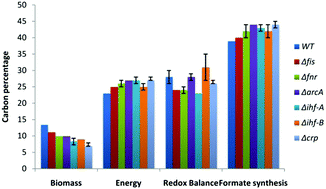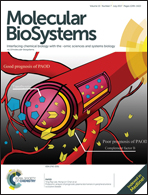The effect of global transcriptional regulators on the anaerobic fermentative metabolism of Escherichia coli†
Abstract
Global transcription factors are known to regulate the anaerobic growth of Escherichia coli on glucose. These transcription factors help the organism to sense oxygen and accordingly regulate the synthesis of mixed acid producing enzymes. Five global transcription factors, namely ArcA, Fnr, IhfA-B, Crp and Fis, are known to play an important role in the growth phenotype of the organism in the transition from anaerobic to aerobic conditions. The effect of deletion of most of these global transcription factors on the growth phenotype has not been characterized under strict anaerobic fermentation conditions. In order to enumerate the role of global transcription factors in central carbon metabolism, experiments were performed using single deletion mutants of the above mentioned global transcription regulators. The mutants demonstrated lower growth rates, ranging from 3–75% lower growth as compared to the wild-type strain along with varying glucose uptake rates. Global transcription regulators help in lowering formate and acetate synthesis, thereby effectively channeling the carbon towards redox balance (through ethanol formation) and biomass synthesis. Flux analysis of mutant strains indicated that deletion of a single transcription factor alone does not play a significant role in the normalized flux distribution of the central carbon metabolism.



 Please wait while we load your content...
Please wait while we load your content...